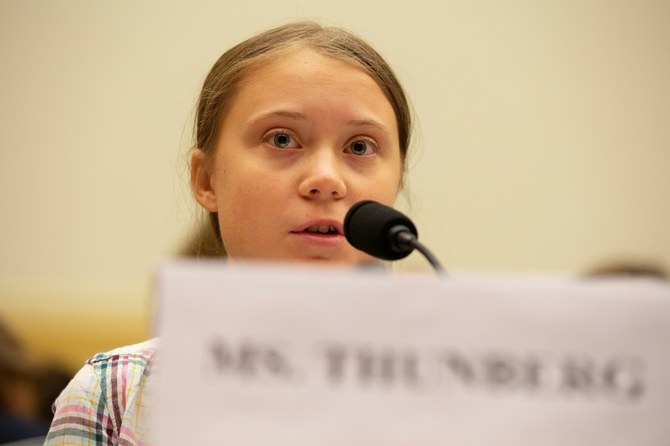
- ARAB NEWS
- 05 Jul 2025

Much has happened since August 2018, when a then unknown 15-year-old Swedish girl called Greta Thunberg sat outside her country’s parliament every schoolday for three weeks with a placard that read “Skolstrejk för klimatet” (school strike for the climate).
More than four million people took to the streets last Friday in about 4,500 locations in more than 150 countries. Schoolchildren like Thunberg were joined by adults. Even 1,800 Amazon workers demanded that the tech giant’s 2040 deadline to become carbon neutral be brought forward to 2030, and their boss Jeff Bezos agreed. The influential German newspaper Frankfurter Allgemeine Zeitung described Friday’s events in an article aptly entitled “One turned into thousands” — into millions would have been more appropriate.
Thunberg gained so much prominence that she was invited to join the rich and powerful at the World Economic Forum’s annual meeting in Davos. She not only talked the talk but walked the walk, and braved the freezing January nights in a small tent. Davos propelled her and her cause to global prominence. After that, school strikes took place in cities around the world, Friday after Friday. There were big events such as the Extinction Rebellion protests in the UK, or Thunberg’s appearance at the Hambach Forest in North Rhine-Westphalia, an ancient woodland due to be cleared to make way for a coal-mine extension, which has been a focal point for German environmentalists since 2012.
The powerful queued to meet the young Swede. She met the leaders of all the UK’s main parties, the Pope, and many heads of state. She crossed the Atlantic on a small sailing yacht to attend UN climate summits in New York and Chile.
Thunberg’s plea to save the planet has resonated with many, especially the young. The movement has declared a climate emergency and is pushing governments, companies and individuals to curb greenhouse gas emissions and restrict the use of plastics. They go further than the Paris climate agreement of 2016, which required a reduction in global greenhouse gas emissions, and restrictedthe increase in global average temperature to less than 2°C above pre-industrial levels. Science has moved on since Paris, and many consider its targets inadequate. The students now demand a limit of 1.5°C, and they want countries and organisations to be carbon neutral by 2030, some even by 2025.
It is easy to empathize with the young. They feel they have inherited a planet ravaged by generations of careless use of its resources, carbon dioxide emissions and plastic waste in the oceans. They see increased frequency and intensity of natural disasters such as hurricanes, floods and droughts. They fear rising sea levels will flood the cities they live in. In other words, they feel preceding generations are endangering their livelihoods, “stealing their future.” They truly feel they are faced with a climate emergency, and that they lack voice, so they take to the streets.
But while we empathize, we also need to think things through carefully. The environmental challenge must be addressed, but there is a danger that politicians are swayed by the sheer numbers hitting the streets, and the emotions they generate. Policymakers should think carefully and calibrate their responses, weighing up the environmental, economic and social impact of their decisions.
Thunberg’s plea to save the planet has resonated with many, especially the young. It is easy to empathize with the young, but while we empathize, we also need to think things through clearly.
For example, while livestock are big carbon emitters, meat and eggs are important sources of protein for many, especially in developing countries, where most will not have access to (and in any case cannot afford) the new meat alternatives. Many farmers in these countries also depend on their cows, goats and chickens for their livelihood. Malnutrition among the poorest of the poor cannot be in anybody’s interest.
We should all drive less, and use public transport more, but it will be impossible to replace all gasoline-powered cars with electric or hybrid vehicles overnight. We also need a full lifecycle (production to decommissioning) environmental impact analysis of alternative modes of transport; it takes a lot more copper, for example, to build an electric vehicle than an internal combustion equivalent. Then there is the question of how the electricity is produced, what it takes to install the requisite infrastructure, the toxicity of the batteries and the source of the electricity. Economics plays into this argument as well. In Germany there is a debate on what to do with diesel cars, which may disproportionately affect poorer income sectors of society in rural areas who cannot easily replace their now worthless diesel cars, and still need to get around without adequate public transport.
Yes, to save the planet we will have to adjust how we live, but we need feasible solutions that protect the poor and the weak from economic ruin. We also need to ensure that the lights stay on while we engineer the energy transition. We will need oil and gas for decades, or homes in many parts of the world will go dark and unheated.
Christiana Figueres, former head of the UN Framework Convention on Climate Change, said last week that bringing forward the 2050 target for a carbon neutral world was great, but cautioned against ambitious proposals such as 2030, or even 2025. She considers 2040 to be appropriate.
Figueres has a point. If the policies become too stringent and unforgiving, the students may be assuaged. However, there will be a backlash from people who cannot afford to comply with the new measures or whose health will be affected. Among them may be the parents of those protesting schoolchildren, or even the children themselves.
We must save the planet, but in a way that safeguards the interests of the many, or we may be faced with a backlash that eliminates how far we have come since the Paris agreement, with the help of those young activists.